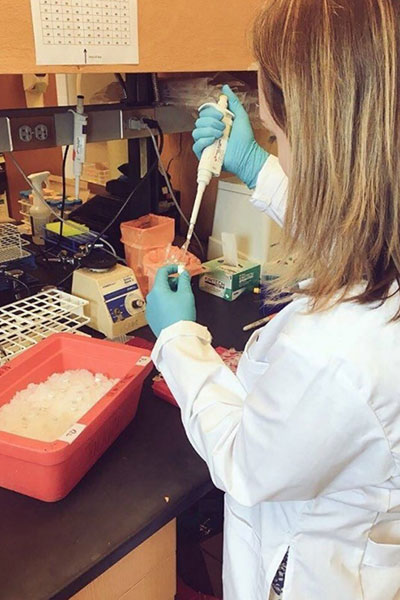Patient EducationSep | 7 | 2022
From Symptoms to Diagnosis to World-Class Treatment: One Patient’s Celiac Disease Story
Approximately 1% of the world’s population have celiac disease, a chronic autoimmune disorder that occurs in patients with compatible genetics caused by ingestion of gluten contained in grains such as wheat, rye, and barley. According to research, many symptomatic patients go undiagnosed or experience diagnostic delays.
This was certainly the case for Lisa*, a Massachusetts resident whose search for a diagnosis started after a family vacation to New York City. Before the trip, Lisa knew that she did not tolerate gluten well and, whenever she removed gluten from her diet, she felt better.
Then, she says, “Life just happened, and things got busy,” so, bit by bit, although she suspected a gluten sensitivity, she became less vigilant about her dietary intake.
While in New York, Lisa and her family enjoyed a lot of pizza and pasta, which made her feel really sick.
“It wasn’t so much gastrointestinal symptoms; I just didn’t feel myself. I had neurological issues, and it was a scary place to be,” she says.
When she returned to Massachusetts, Lisa reports, she spoke with a nurse and, later, a doctor to discuss her ongoing symptoms and concerns. The nurse assured her that she did not have celiac disease, but the doctor, who practiced at another area hospital, agreed to test her via a blood test.

Celiac disease symptoms can mimic those of other digestive disorders, so providers do not diagnose the disease based on symptoms alone but use other diagnostic tools. Also, based on the genetic nature of the disease, providers typically ask about family medical history.
Lisa does not have a family history of celiac disease, but she pursued testing with the doctor who proceeded to conduct diagnostic bloodwork to check for levels of certain antibodies that are often higher than normal in individuals with untreated celiac disease.
Lisa’s blood test came back positive.
Based on her own research, Lisa knew that, in addition to the blood test, a definitive diagnosis required a small-intestine biopsy. Her healthcare provider advised her to “just stop eating gluten,” said Lisa. However, for her biopsy to yield accurate results, Lisa knew that she needed to keep eating what may have been making her ill.
Once the biopsy results confirmed her diagnosis, Lisa knew she needed to access a specialized clinical practice, such as the Center for Celiac Research and Treatment at Mass General for Children.
She explains, “I really wanted to come here (to the Center for Celiac Research and Treatment), because this is a world-famous research institution, so you cannot go wrong.”
In 2018, Lisa transferred her care to the Center.
After talking to Dr. Leonard and the team, I realized that the endoscopy was the right thing to do because, someday, there might be a pharmaceutical treatment for celiac disease, and I might be able to get some help,” Lisa says.
Meanwhile, working with her physician and the Center’s clinical dietitian, Lisa started her gluten-free diet. To date, this is the only available treatment plan for celiac disease.
“For me, the diet has been fine,” she says. “I do miss some things, like a cheese Danish, but I love to cook, so the gluten-free diet hasn’t been a huge shift.”
Also, in adjusting to the realities of being a patient living with celiac disease, Lisa credits the quality of care at the Center: “Every single experience I’ve had here with nurses, doctors and the dietitian has been so positive.”
Last year, three years after her diagnosis, Lisa decided to join one of the Center’s clinical trials, a 14- gluten challenge for adults (18 to 75) with biopsy-proven celiac disease who have been on a gluten-free diet for at least six months. In November 2021, Lisa completed the challenge**.
Now, looking back on her celiac story, Lisa acknowledges that, while there were some diagnostic frustrations along the way, “there is a positive happy ending to this experience.”
*The patient’s name has been changed to protect privacy.
**To learn more about Lisa’s experience during the gluten challenge clinical trial, read her interview here.
